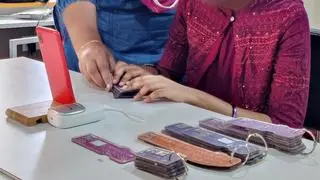When Sundeep Thakran approached him to start a venture all over again, K Vaitheeswaran says he laid out three conditions for them to work together once more. First, it must be something that hadn’t been done before. Second, it must be in an area that he was clueless about. And, third, it must potentially have great significant social impact.
“We evaluated multiple opportunities and finally this particular beverage as we progressed, ticked all the three boxes that I had put,” says Vaitheeswaran, who was an e-commerce pioneer having co-founded FabMart in 1999 with five others, including Sundeep. This was long before e-commerce became the buzz word that it is today. More importantly, it was in the days of dial-up Internet. FabMart.com became Indiaplaza.com, which Vaitheeswaran shut down in 2013. He has chronicled his experiences, the trials and tribulations of running a venture that was way ahead of its time and why he had to shut down the business, in his book Failing to succeed: The story of India’s first e-commerce company .
Why again, I ask Vaitheeswaran, as we have this conversation over telephone. “You mean the brand name or the business domain,” he throws back. No, why did he become a founder again? Vaitheeswaran, 56, an electronics engineering graduate from the Government College of Engineering, Tirunelveli, says he had no plans of starting up again. He draws attention to the closing portions in his book where he wonders whether he will start up again. At that time, he says, he had no plans of starting up. And, certainly had no plans of starting up a brand called Again.
The luck factor
Vaitheeswaran was busy finishing his book when Sundeep approached him saying why don’t they team up for another venture. “I had no plans of starting up again after the experience I had earlier. Not because I didn’t want to start up, but I realised that there are significant challenges on both sides and I am inclined to think that there is a huge factor of success in start-ups for entrepreneurs. That is the luck factor.”
“I think,” he adds, “we don’t give it enough credit because it is such a high risk, high reward game.” There are investors and there are serial entrepreneurs and seasoned entrepreneurs all of whom think there is some kind of a playbook, which if you do all of these things then this will happen. “I have a feeling that the most important factor for success, especially in India for an entrepreneur and a start-up, is to be at the right place at the right time. That is purely a matter of luck,” he says. If you are in the right place at the right time and the market looks up, you are a great entrepreneur, and if you are not there, the market looks at you differently.
Vaitheeswaran, who teamed up with Sundeep to launch beverages under the brand name Again in March 2019, says the dairy-based beverage has no refined sugar, no preservatives, no artificial flavours, has a 90-day shelf life without refrigeration and is wholesome and nutritious. “It ticked all my boxes,” he adds. But why did he insist on being clueless about a sector for him to do business in? “The point that I made to myself is, in the event that it doesn’t work out the way we want it to work out, at the very least, I must be able to walk off from this saying I learnt something new in life.”
Since launching the beverage, he says he has learnt a lot about the FMCG and the food and beverage business. For them to make a mark in the already crowded F&B segment, where there are giants with huge marketing budgets, their drink had to truly stand out. Again Drinks fits this perfectly as there is no other drink like it in the market, says Vaitheeswaran.
The big advantage
He says something that goes against conventional wisdom as far as founders are concerned. “I have a feeling we lay too much stress on domain knowledge. Entrepreneurs, by their DNA, are essentially problem solvers.” You have a problem in front of you, you have an opportunity in front of you, you use your mind, you use your tools, you use your networks, you hustle around the problem, you wrestle with it and then you solve it. What the problem is, is irrelevant. Entrepreneurs are like that. Any problem can be solved from base principles by simply asking a series of questions. Once you have some answers, if it is a mature domain like FMCG good talent can be sourced.
“Lack of domain knowledge sometimes is an advantage because there is no baggage. When we started this business, we wanted to develop a beverage with no refined sugar, no preservatives, no artificial colours or flavours yet being ambient and 90-day shelf life. We spoke to experts who told us this cannot be done because it has never been done before. If we had domain knowledge, we would have accepted this baggage-driven conclusion. Because we were clueless, we said we will give it a shot,” says Vaitheeswaran. If every founder launches a start-up in his or her domain, there wouldn’t be any pioneers.
While the perception that they thought of the brand name Again for the beverage was to convey that they were back in business, Vaitheeswaran says that they were confident that consumers will like a “truly nutritious and wholesome beverage” and have it regularly – or, again and again. And, “there is so much nutrition and goodness in the beverage that whenever you drink it, there is a gain for you!”
What was his frame of mind when he decided to do another start-up? How did his family take it? During his Indiaplaza days, Vaitheeswaran says he believed that for entrepreneurs, their start-up was their life, it is their baby and they had to do everything to make sure they succeed and it must be their all-consuming passion in life. Since then, he adds, he has reversed his opinion. At least for him, he says, whatever start-up he does, that is no longer the important thing in his life. “The most important thing in my life now is my family.” He took his wife Radhika, who has a Master’s in engineering, through his plan and promised her that the start-up will be the second most important thing for him; his family would come first.
Building a moat for the business in its early days is important for the founder to ensure that they have a chance to succeed. Having a moat, says Vaitheeswaran, is critical because it gives a talking point about your business for it to appeal to customers. The FMCG space, he points, has three parts to the business – distribution, brand and product innovation.
They have entered the beverages business where there are multinationals that can outspend them in brand-building or in having a deep distribution network. The only option available for them was to go in for product innovation, which is what they did with their beverage. “The only way a customer will drink our product is because it offers something other drinks do not offer,” says Vaitheeswaran. A product has to have a moat that is tangible, something where the customers are able to see an immediate gratification.
From his experience, Vaitheeswaran says founders must always have the ability to influence the destiny of their start-up and control the future and destiny in terms of decision-making. Despite the drawbacks and setbacks, it is possible to come back and do it again and succeed. This is more about resilience, which is a great lesson for entrepreneurs. “Entrepreneurs,” he says, “must be able to walk off from their previous start-up irrespective of how it ended and have the ability to go and do it again.”
If the government is really keen on promoting entrepreneurship and making it easy for doing business – and not go by the ease of doing business ranking – it should then make it easy to close down companies.
“I would like the government to rank India on how easy it is to close a company. If we can say that in that I am in the top 10, then truly we can say there is ease of doing business. Ease of doing business is not about starting a company, it is about closing a company. Nobody wants to talk about it. The process is so cumbersome.”
He feels founders should not raise money till they have proved the concept that it is a scalable business. And, that it is likely to be a profitable business. The start-up ecosystem does not focus enough on profitability and sustainability.
Suggestions for entrepreneurs
What would be his five suggestions for entrepreneurs? Try and solve a genuine problem. Two, focus on creating value inside the business as opposed to valuation. Third, focus on the real investor, which is the customer, who is willing to pay for the product or service without asking for either equity or the money back. Fourth, don’t ever forget the fact that the start-up is a small part of your life. Last, and most important, founders need to run their business with the highest standards of personal integrity, uncompromising, non-negotiable personal standards of integrity, says Vaitheeswaran, who is a fan of Ilayaraja’s music, loves watching Test match cricket and now is into football.








Comments
Comments have to be in English, and in full sentences. They cannot be abusive or personal. Please abide by our community guidelines for posting your comments.
We have migrated to a new commenting platform. If you are already a registered user of TheHindu Businessline and logged in, you may continue to engage with our articles. If you do not have an account please register and login to post comments. Users can access their older comments by logging into their accounts on Vuukle.